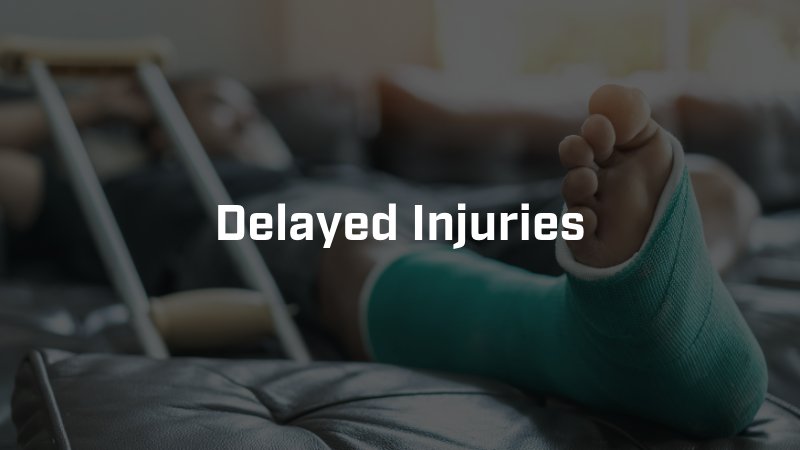The immediate aftermath of a collision can be a confusing and honestly terrifying experience. The reality is that incidents like this lead to our body producing rushes of adrenaline, which can mask the most immediate symptoms of several types of injuries. Unfortunately, “delayed” injuries can be severe and have long-lasting consequences for victims.

Understanding Delayed Injuries
Delayed injuries, as the name implies, are those that do not present symptoms immediately after an accident. The surge of adrenaline and endorphins during a traumatic event can temporarily mask pain and discomfort, leading individuals to believe they are uninjured. However, as these chemicals subside, underlying injuries may become apparent hours, days, or even weeks later.
Common Types of Delayed Injuries
Several injuries commonly manifest after a delay following a car accident:
- Whiplash. This neck injury results from the rapid back-and-forth movement of the head during a collision. Symptoms such as neck pain, stiffness, and headaches may not appear until 24 hours or more after the incident.
- Concussions and Traumatic Brain Injuries (TBIs). Head injuries can be deceptive, with symptoms like headaches, dizziness, confusion, and memory problems emerging well after the accident. According to the National Institute of Neurological Disorders and Stroke, TBIs can lead to significant cognitive and physical impairments if not promptly addressed.
- Back Injuries. Herniated discs or soft tissue injuries in the back may not cause immediate pain. Delayed symptoms can include back pain, muscle spasms, or reduced mobility.
- Internal Injuries. Damage to internal organs, including the kidneys, spleen, and liver, or internal bleeding might not be immediately evident. Symptoms such as abdominal pain, dizziness, fainting, or deep bruising can develop over time and require urgent medical attention.
- Emotional and Psychological Injuries. Post-Traumatic Stress Disorder (PTSD), anxiety, and depression can develop days or weeks after the accident, affecting an individual’s mental health and daily functioning.
Why Do Delayed Injuries Occur?
Several factors contribute to the delayed onset of injury symptoms:
- Adrenaline Response. The body’s natural “fight or flight” response releases adrenaline, which can temporarily mask pain and discomfort.
- Soft Tissue Damage. Injuries to muscles, ligaments, and tendons may not cause immediate pain but can develop into more serious conditions if untreated.
- Inflammatory Processes. The body’s inflammatory response to injury can take time to develop, leading to delayed swelling and pain.
Importance of Prompt Medical Evaluation
Seeking medical care right after a car accident is crucial, even if no symptoms are present. A healthcare professional can:
- Identify Hidden Injuries. Early diagnosis can prevent minor injuries from becoming severe.
- Document Injuries. Medical records serve as essential evidence if legal action becomes necessary.
- Provide Appropriate Treatment. Timely intervention can lead to better recovery outcomes and prevent complications.
Steps to Take After a Car Accident
To protect your health and legal rights:
- Seek Immediate Medical Attention. Even if you feel fine, a medical evaluation can uncover hidden injuries.
- Monitor Your Health. Be vigilant for any new or worsening symptoms in the days and weeks following the accident.
- Document Everything. Keep detailed records of medical visits, symptoms, and any communications with insurance companies.
- Consult a Personal Injury Attorney. Legal counsel can guide you through the claims process and help protect your rights. Please speak to a Phoenix attorney with experience handling car accident claims.
Delayed injuries from car accidents are a serious concern that can have lasting effects on your health and well-being. Understanding the potential for delayed symptoms and taking proactive steps can help ensure proper medical care and legal protection. Always prioritize your health and seek professional advice from a Phoenix injury lawyer when dealing with the aftermath of an accident.
